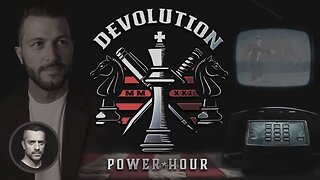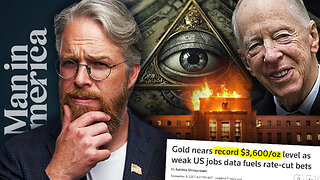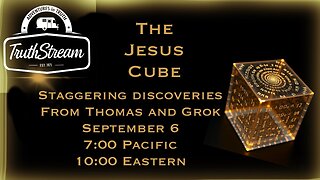Premium Only Content

Episode 1387: Catholic Gender Identity
When I was a kid at times I would ask my dad or mom why certain things were the way they were and the classic answer was “Well it all changed after the War”. WWII.
When my kids asked me why certain things were the way they were and the classic answer I gave “Well it all changed after the Vatican II”.
See our lady of Fatima said that if man did not change there would be a worse war than WWI and many would suffer and die and WWII was just that. It was a war that changed the world. Afterwards that generation that fought that war which they called the greatest generation were actually the generation that allowed for a complete society shift and then the destruction of the Catholic Church. So that greatest generation actually ushered in devastation. Very few are left today because they would be in the late 90’s to 100 and so here we are with the carnage of all that. Now we are taking it to another all time stanic high. The WW2 generation ushered in abortion and homosexuality and our generation is ushering murder after birth, homesexual marriages and gender mutilation.
What is our Church doing? Are they standing up against any of this? Nope they are trying to find a tricky way to accept homeosexual unions. Is it any wonder we are in such deep crap?
The Traditional Catholic Church rejects the concept of gender as a social construct or something that can be self-determined apart from one's biological sex. They uphold the idea that one's gender identity should align with their biological sex, and any deviation from this alignment is seen as contrary to God's design.
This perspective leads to the Church's opposition to various contemporary ideas regarding gender identity, such as transgender and non-binary identities. Individuals who experience gender dysphoria or have questions about their gender identity are generally encouraged to embrace and accept the gender assigned to them at birth in line with Catholic teachings.
It's important to note that there may be differences in the way individual Catholic clergy or communities approach these issues, but the general stance of the Traditional Catholic Church is grounded in its traditional understanding of human nature and the natural law. When ever the modern culture attempts to redefine matters what do you do as Catholics? Don’t you dare consult with the modern Catholic church. They usurpers of the true Catholic Church let alone sell outs. Go back to the Traditional faith and consult the great saints. Why? Because there is nothing new under the sun.
St. Augustine of Hippo, St. Thomas Aquinas, and St. Teresa of Avila, among others, emphasized the importance of embracing one's God-given nature and accepting one's biological sex within the context of their broader teachings on human nature, morality, and spirituality. Here's a brief overview of their perspectives:
St. Augustine of Hippo (354-430 AD):
St. Augustine, one of the most influential Church Fathers, believed in the essential goodness of God's creation, including human nature. He taught that God created human beings with a purpose and design, and fulfilling that purpose was the key to living a virtuous life. Augustine's emphasis on embracing one's God-given nature centered on living in accordance with God's will and commandments.
Regarding gender, Augustine viewed male and female as complementary aspects of humanity, both reflecting the image of God. He saw the differences between the sexes as part of God's plan for procreation and the continuation of the human race. Augustine's teachings on sexual ethics emphasized the importance of chastity and the sanctity of marriage, where the union between a man and a woman was seen as a reflection of Christ's relationship with the Church.
St. Thomas Aquinas (1225-1274):
St. Thomas Aquinas, a prominent theologian and philosopher, integrated Aristotelian philosophy with Christian theology. He also stressed the inherent goodness of God's creation and the importance of natural law. According to Aquinas, God's design for human nature was expressed through the principles of reason and natural law.
Regarding gender roles, Aquinas saw the sexual differences between men and women as part of the natural order. He argued that the biological differences served a purpose in procreation and the overall functioning of society. Aquinas upheld the traditional understanding of male and female roles within the family and society, emphasizing the importance of fulfilling these roles virtuously and in accordance with natural law.
St. Teresa of Avila (1515-1582):
St. Teresa of Avila was a Carmelite nun and a prominent mystic who wrote extensively about her spiritual experiences and the importance of prayer. While her teachings did not directly focus on gender roles or biological sex, she emphasized the significance of embracing one's unique calling and vocation in life. For Teresa, this involved seeking a deeper relationship with God through prayer and the practice of virtue.
Overall, these saints' teachings emphasized the idea of living in harmony with God's creation, which included accepting one's biological sex and fulfilling the roles and responsibilities associated with it. It's important to understand their teachings in the context of their time and cultural background, as well as within the broader framework of Catholic theology and ethics. Today, the understanding of gender identity and related issues has evolved, and discussions continue within the Catholic Church to address these matters with sensitivity and pastoral care.
Hold fast Catholics and get away from the Novus Ordo church and start Home Schooling your Children because the devil is on the prowl in Modern Church and the secular and Catholic Schools.
Lets hear from the good father on this matter.
-
 LIVE
LIVE
DoldrumDan
3 hours agoPARRY ONLY CONSORT RADAHN - TODAY IS THE DAY - FIRST PLAYTHROUGH
25 watching -
 8:10
8:10
MattMorseTV
18 hours ago $23.52 earnedTrump's "SURPRISE" for MADURO.
140K118 -
 24:39
24:39
GritsGG
17 hours agoINSANE Ranked Game on Warzone!
31.4K3 -
 LIVE
LIVE
Lofi Girl
2 years agoSynthwave Radio 🌌 - beats to chill/game to
433 watching -
 5:52:00
5:52:00
Akademiks
13 hours agoWAR IN ATLANTA Episode 5. YOUNG THUG FIRST INTERVIEW about SNITCHING, GUNNA... BREAKS DOWN CRYING!
175K10 -
 7:30:25
7:30:25
SpartakusLIVE
17 hours agoVerdansk Duos w/ Nicky || Saturday Spartoons - Variety Later?!
69.1K1 -
 1:38:47
1:38:47
Badlands Media
1 day agoDevolution Power Hour Ep. 387: Trump, Epstein, Durham Mysteries, and North Korea Ops
114K35 -
 1:05:23
1:05:23
Man in America
20 hours agoSoaring Gold Exposes the Imminent Crash of the Old System w/ John Perez
70.2K28 -
 2:42:40
2:42:40
TruthStream with Joe and Scott
20 hours agoTHOMAS AND GROK: AI, Bible decodes, The JESUS Cube live 9/6 #487
56.4K12 -
 2:34:46
2:34:46
BlackDiamondGunsandGear
15 hours agoGet Prepped / After Hours Armory / LIVE SHOW /
36.7K3